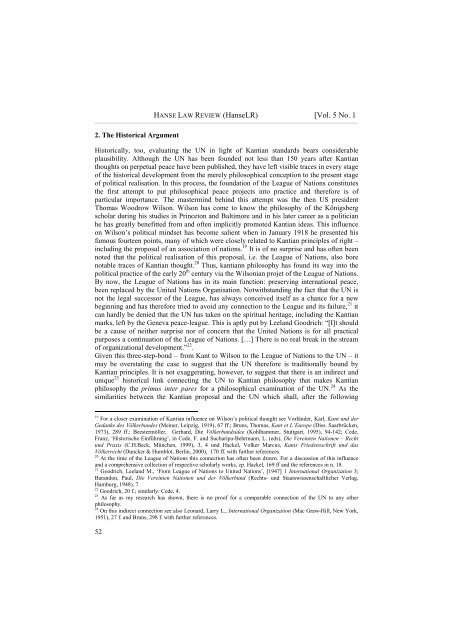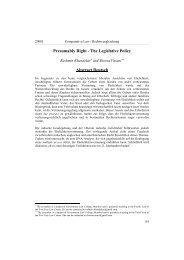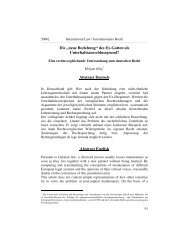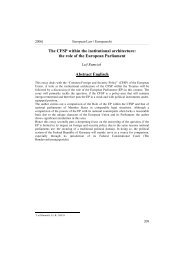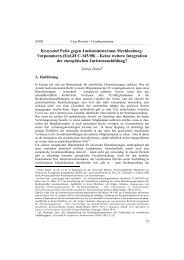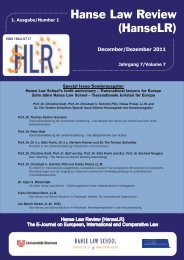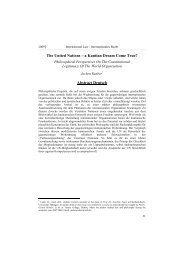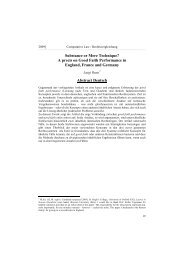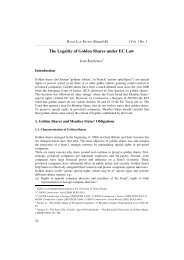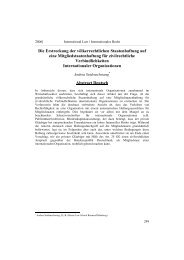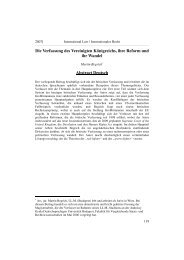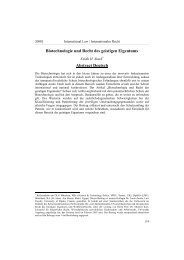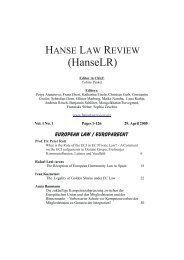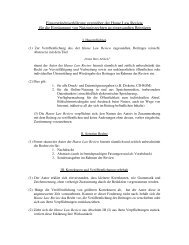The United Nations – a Kantian Dream Come True? - Hanse Law ...
The United Nations – a Kantian Dream Come True? - Hanse Law ...
The United Nations – a Kantian Dream Come True? - Hanse Law ...
Create successful ePaper yourself
Turn your PDF publications into a flip-book with our unique Google optimized e-Paper software.
HANSE LAW REVIEW (<strong>Hanse</strong>LR) [Vol. 5 No. 1<br />
___________________________________________________________________________________________________________________________________________________<br />
2. <strong>The</strong> Historical Argument<br />
Historically, too, evaluating the UN in light of <strong>Kantian</strong> standards bears considerable<br />
plausibility. Although the UN has been founded not less than 150 years after <strong>Kantian</strong><br />
thoughts on perpetual peace have been published, they have left visible traces in every stage<br />
of the historical development from the merely philosophical conception to the present stage<br />
of political realisation. In this process, the foundation of the League of <strong>Nations</strong> constitutes<br />
the first attempt to put philosophical peace projects into practice and therefore is of<br />
particular importance. <strong>The</strong> mastermind behind this attempt was the then US president<br />
Thomas Woodrow Wilson. Wilson has come to know the philosophy of the Königsberg<br />
scholar during his studies in Princeton and Baltimore and in his later career as a politician<br />
he has greatly benefitted from and often implicitly promoted <strong>Kantian</strong> ideas. This influence<br />
on Wilson’s political mindset has become salient when in January 1918 he presented his<br />
famous fourteen points, many of which were closely related to <strong>Kantian</strong> principles of right <strong>–</strong><br />
including the proposal of an association of nations. 19 It is of no surprise and has often been<br />
noted that the political realisation of this proposal, i.e. the League of <strong>Nations</strong>, also bore<br />
notable traces of <strong>Kantian</strong> thought. 20 Thus, kantiann philosophy has found its way into the<br />
political practice of the early 20 th century via the Wilsonian projet of the League of <strong>Nations</strong>.<br />
By now, the League of <strong>Nations</strong> has in its main function: preserving international peace,<br />
been replaced by the <strong>United</strong> <strong>Nations</strong> Organisation. Notwithstanding the fact that the UN is<br />
not the legal successor of the League, has always conceived itself as a chance for a new<br />
beginning and has therefore tried to avoid any connection to the League and its failure, 21 it<br />
can hardly be denied that the UN has taken on the spiritual heritage, including the <strong>Kantian</strong><br />
marks, left by the Geneva peace-league. This is aptly put by Leeland Goodrich: “[I]t should<br />
be a cause of neither surprise nor of concern that the <strong>United</strong> <strong>Nations</strong> is for all practical<br />
purposes a continuation of the League of <strong>Nations</strong>. […] <strong>The</strong>re is no real break in the stream<br />
of organizational development.” 22 .<br />
Given this three-step-bond <strong>–</strong> from Kant to Wilson to the League of <strong>Nations</strong> to the UN <strong>–</strong> it<br />
may be overstating the case to suggest that the UN therefore is traditionally bound by<br />
<strong>Kantian</strong> principles. It is not exaggerating, however, to suggest that there is an indirect and<br />
unique 23 historical link connecting the UN to <strong>Kantian</strong> philosophy that makes <strong>Kantian</strong><br />
philosophy the primus inter pares for a philosophical examination of the UN. 24 As the<br />
similarities between the <strong>Kantian</strong> proposal and the UN which shall, after the following<br />
19 For a closer examination of <strong>Kantian</strong> influence on Wilson’s political thought see Vorländer, Karl, Kant und der<br />
Gedanke des Völkerbundes (Meiner, Leipzig, 1919), 67 ff.; Bruns, Thomas, Kant et L’Europe (Diss. Saarbrücken,<br />
1973), 289 ff.; Beestermöller, Gerhard, Die Völkerbundsidee (Kohlhammer, Stuttgart, 1995), 94-142; Cede,<br />
Franz, ‘Historische Einführung’, in Cede, F. and Sucharipa-Behrmann, L. (eds), Die Vereinten Nationen <strong>–</strong> Recht<br />
und Praxis (C.H.Beck, München, 1999), 3, 4 und Hackel, Volker Marcus, Kants Friedensschrift und das<br />
Völkerrecht (Duncker & Humblot, Berlin, 2000), 170 ff. with further references.<br />
20 At the time of the League of <strong>Nations</strong> this connection has often been drawn. For a discussion of this influence<br />
and a comprehensive collection of respective scholarly works, cp. Hackel, 169 ff and the references in n. 18.<br />
21 Goodrich, Leeland M., ‘From League of <strong>Nations</strong> to <strong>United</strong> <strong>Nations</strong>’, [1947] 1 International Organization 3;<br />
Barandon, Paul, Die Vereinten Nationen und der Völkerbund (Rechts- und Staatswissenschaftlicher Verlag,<br />
Hamburg, 1948), 7.<br />
22 Goodrich, 20 f.; similarly: Cede, 4.<br />
23 As far as my research has shown, there is no proof for a comparable connection of the UN to any other<br />
philosophy.<br />
24 On this indirect connection see also Leonard, Larry L., International Organization (Mac Graw-Hill, New York,<br />
1951), 27 f. and Bruns, 298 f. with further references.<br />
52


